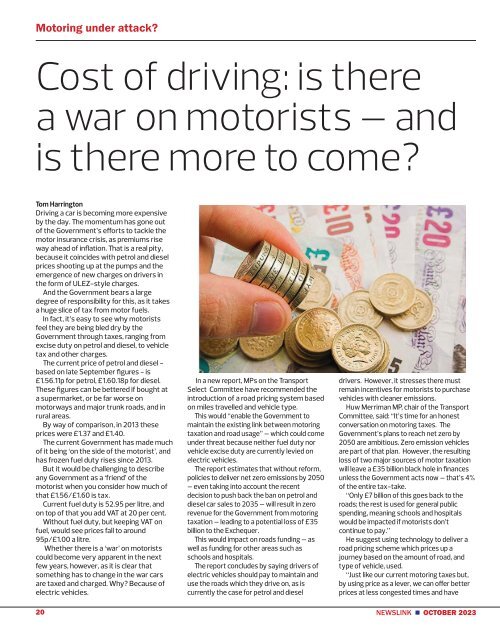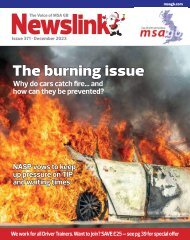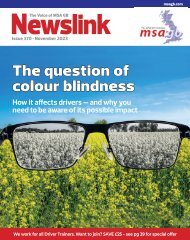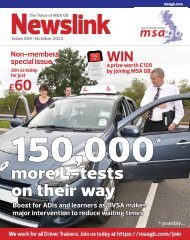Newslink October 2023
Motor Schools Association membership magazine; driving instructors; driver training and testing; road safety
Motor Schools Association membership magazine; driving instructors; driver training and testing; road safety
You also want an ePaper? Increase the reach of your titles
YUMPU automatically turns print PDFs into web optimized ePapers that Google loves.
Motoring under attack?<br />
Cost of driving: is there<br />
a war on motorists – and<br />
is there more to come?<br />
Tom Harrington<br />
Driving a car is becoming more expensive<br />
by the day. The momentum has gone out<br />
of the Government’s efforts to tackle the<br />
motor insurance crisis, as premiums rise<br />
way ahead of inflation. That is a real pity,<br />
because it coincides with petrol and diesel<br />
prices shooting up at the pumps and the<br />
emergence of new charges on drivers in<br />
the form of ULEZ-style charges.<br />
And the Government bears a large<br />
degree of responsibility for this, as it takes<br />
a huge slice of tax from motor fuels.<br />
In fact, it’s easy to see why motorists<br />
feel they are being bled dry by the<br />
Government through taxes, ranging from<br />
excise duty on petrol and diesel, to vehicle<br />
tax and other charges.<br />
The current price of petrol and diesel -<br />
based on late September figures - is<br />
£1.56.11p for petrol, £1.60.18p for diesel.<br />
These figures can be bettered if bought at<br />
a supermarket, or be far worse on<br />
motorways and major trunk roads, and in<br />
rural areas.<br />
By way of comparison, in 2013 these<br />
prices were £1.37 and £1.40.<br />
The current Government has made much<br />
of it being ‘on the side of the motorist’, and<br />
has frozen fuel duty rises since 2013.<br />
But it would be challenging to describe<br />
any Government as a ‘friend’ of the<br />
motorist when you consider how much of<br />
that £1.56/£1.60 is tax.<br />
Current fuel duty is 52.95 per litre, and<br />
on top of that you add VAT at 20 per cent.<br />
Without fuel duty, but keeping VAT on<br />
fuel, would see prices fall to around<br />
95p/£1.00 a litre.<br />
Whether there is a ‘war’ on motorists<br />
could become very apparent in the next<br />
few years, however, as it is clear that<br />
something has to change in the war cars<br />
are taxed and charged. Why? Because of<br />
electric vehicles.<br />
In a new report, MPs on the Transport<br />
Select Committee have recommended the<br />
introduction of a road pricing system based<br />
on miles travelled and vehicle type.<br />
This would “enable the Government to<br />
maintain the existing link between motoring<br />
taxation and road usage” – which could come<br />
under threat because neither fuel duty nor<br />
vehicle excise duty are currently levied on<br />
electric vehicles.<br />
The report estimates that without reform,<br />
policies to deliver net zero emissions by 2050<br />
– even taking into account the recent<br />
decision to push back the ban on petrol and<br />
diesel car sales to 2035 – will result in zero<br />
revenue for the Government from motoring<br />
taxation – leading to a potential loss of £35<br />
billion to the Exchequer.<br />
This would impact on roads funding – as<br />
well as funding for other areas such as<br />
schools and hospitals.<br />
The report concludes by saying drivers of<br />
electric vehicles should pay to maintain and<br />
use the roads which they drive on, as is<br />
currently the case for petrol and diesel<br />
drivers. However, it stresses there must<br />
remain incentives for motorists to purchase<br />
vehicles with cleaner emissions.<br />
Huw Merriman MP, chair of the Transport<br />
Committee, said: “It’s time for an honest<br />
conversation on motoring taxes. The<br />
Government’s plans to reach net zero by<br />
2050 are ambitious. Zero emission vehicles<br />
are part of that plan. However, the resulting<br />
loss of two major sources of motor taxation<br />
will leave a £35 billion black hole in finances<br />
unless the Government acts now – that’s 4%<br />
of the entire tax-take.<br />
“Only £7 billion of this goes back to the<br />
roads; the rest is used for general public<br />
spending, meaning schools and hospitals<br />
would be impacted if motorists don’t<br />
continue to pay.”<br />
He suggest using technology to deliver a<br />
road pricing scheme which prices up a<br />
journey based on the amount of road, and<br />
type of vehicle, used.<br />
“Just like our current motoring taxes but,<br />
by using price as a lever, we can offer better<br />
prices at less congested times and have<br />
20 NEWSLINK n OCTOBER <strong>2023</strong>
















